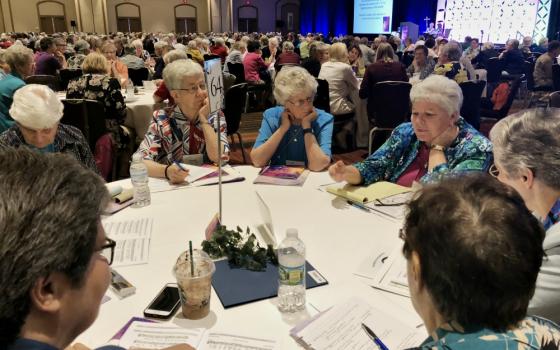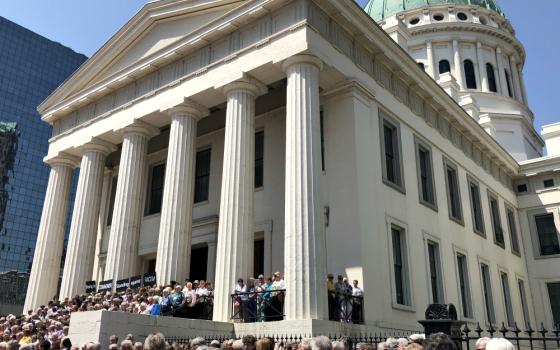Leadership in a global community requires seeing the connections between what might otherwise seem like disparate subjects, such as racism and climate change.
Likewise, it would be easy to look at the schedule for LCWR's upcoming assembly and see it as a collection of random parts: a keynote address on global religious life, sessions for strategic planning, a panel discussion on social justice, an election, and a leadership award.
But St. Joseph Sr. Carol Zinn, executive director of the Leadership Conference of Women Religious, said the Aug. 13-16 event in Scottsdale, Arizona, should be seen as a cohesive whole.
"We're trying to be faithful to the question of what does God need from religious life at this moment in time," Zinn said. "This is one conversation that's being entered through different doorways."
The theme for this year's annual event is "Imagining leadership in a global community." Sr. Pat Murray, executive director of International Union of Superiors General and a member of the Institute of the Blessed Virgin Mary, will give the keynote address on religious life internationally, and current LCWR president and Holy Cross Sr. Sharlet Wagner will address religious life at the national level in her presidential address.
There will also be sessions on the emergent planning process, in which LCWR members are working to discern and shape the future structure of LCWR. Members will also vote on the next president-elect; candidates are Sr. Elise García of the Adrian Dominicans and Sr. Marcia Ann Fiutko of the Franciscan Sisters of St. Joseph.
The session on social justice will be a panel discussion of the intersection of racism, migration and the climate crisis. The panel will include:
- LCWR member Sr. Patricia Chappell, a Sister of Notre Dame de Namur who spent nine years as executive director of Pax Christi USA;
- Maria Elena Perales, director of the St. Joseph Justice Center for the Sisters of St. Joseph of Orange, California;
- Franciscan Sr. Joan Brown, executive director of New Mexico Interfaith Power and Light.
At the 2018 assembly, following the social justice session in St. Louis, attendees were encouraged to attend a short, silent protest against racism near the courthouse that was the site of the first two trials of the historic Dred Scott case, which ruled in 1857 that African Americans could not claim U.S. citizenship. The hot weather in Phoenix in August, however, makes going outside impractical, Zinn said, so attendees will instead use the time to contact the president and members of Congress and encourage them to fight racism and climate change and to welcome immigrants.
The assembly will end with the presentation of the LCWR Outstanding Leadership Award to Sr. Norma Pimentel, a member of the Missionaries of Jesus and the executive director of Catholic Charities of the Rio Grande Valley in the Diocese of Brownsville, Texas, which cares for thousands of migrants who have crossed the border into the United States. In 2015, Pope Francis praised her for her work and later met her in person, where she gave him a painting she made for him.
Pimentel has become a national symbol of the church's stance on and commitment to migrants. In her role, she leads an army of laypeople and volunteers.
"Sister Norma captures what outstanding leadership looks like," Zinn said. "For us, she personifies that."
All of these facets that will be in play at the assembly are intimately tied together, Zinn said, noting that Scottsdale is in a region deeply tied to its indigenous people and less than 200 miles from the Mexican border at Nogales, where part of the migrant crisis is playing out.
"All of [the assembly] is looking at the question of what is the leadership we need in this moment, in this place, in this country, in this world," Zinn said. "We know that racism is deeply tied to the migration crisis, that both of those are tied to the climate crisis, and all of it is tied to the question of what is ours to do today, what does it mean to be a leader?"
Zinn said all of the sessions will be shaped by the question of meaning: What does the issue mean, what does leadership in the context of that issue mean, and what does it mean to serve in a world that gets smaller every day, where global issues are simply grassroots issues writ large?
The 2019 assembly will also have a larger number of guests. Zinn said while groups such as Giving Voice usually send two or three sisters as exhibitors, this year, LCWR has asked for five or six representatives. Likewise, the Association of Latin American Missionary Sisters (AHLMA) and the National Black Sisters' Conference usually just send their executive directors, but this year, LCWR has invited five or six members from each.
"Hopefully, there will be at least one non-[LCWR] member at each table, and some will have two," Zinn said. "It's an opportunity to enrich that conversation. We're trying to widen the circle of insight."
While in the past, Spanish-speaking attendees have sat together with a translator, this year, there will be translators in glass booths at the back of the room so Spanish-speakers can be at any table while listening to simultaneous translation with headphones. Much of the assembly will also be live-streamed so anyone can see the proceedings as they happen or watch the video later.
"These are little things, but they're not so little when you're trying to be inclusive," Zinn said.
Zinn said it is fitting that the assembly will end with remarks by Pimentel at the closing banquet because she is an example of how all the diverse threads of the week — leadership and service amid racism, migration and climate change — come together in the work of women religious.
"We end where we began: women religious leading in ways no one would have ever imagined 30 or 40 years ago," she said.
[Dan Stockman is national correspondent for Global Sisters Report. His email address is dstockman@ncronline.org. Follow him on Twitter and on Facebook.]


